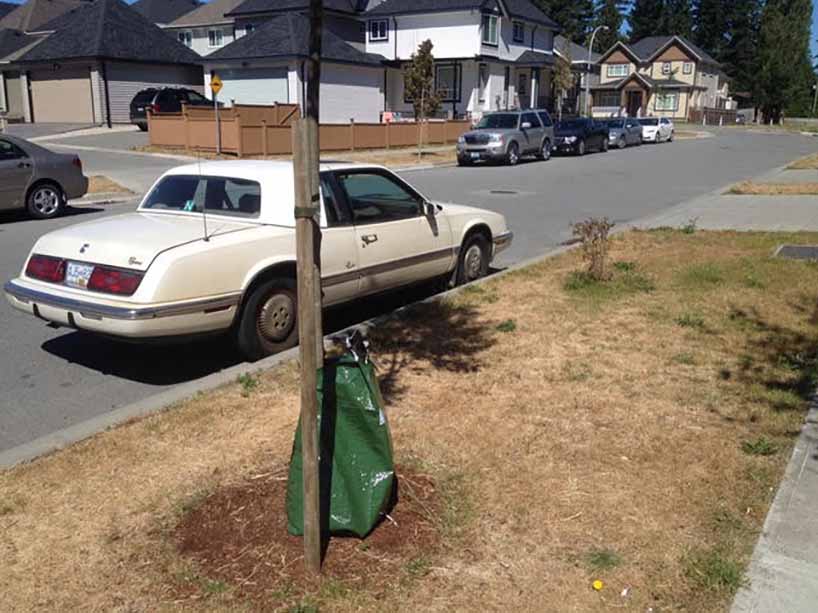Special TMU bursary helps youth from government care pursue higher education

A special TMU bursary is helping Cody Jacques, above, and others like him who also grew up in government care, realize their potential. (Courtesy of Cody Jacques)
Growing up in B.C., Cody Jacques didn’t have a safe family to live with.
Instead, he lived in the care of the government, bouncing between group homes, safe houses, and at times - the street.
At the age of 16, he found himself homeless and living in a 1990 Buick Riviera.
The possibility of attending post-secondary school was unthinkable. Just graduating from high school was daunting. Often, so was surviving.
Today - only 10 years after he was living in a car - not only does Jacques have a home, a dog he loves and a career he has built working for the B.C. Public Service, he’s completing a master’s degree in Child and Youth Care at Toronto Metropolitan University (TMU).
What’s helping him pursue his dream? A special TMU bursary, created to help former youth in care like Jacques, realize their potential.

Cody Jacques, above, with his dog, Foggy. (Courtesy of Cody Jacques)
Bursary covers 50 per cent of tuition
For Canadian citizens, permanent residents, or protected persons beginning their studies at TMU this fall, who had been living in government care and qualify for government student aid, TMU’s Tuition Bursary for Youth in Extended Society Care may cover 50 per cent of their tuition and ancillary fees.
TMU is one of 21 post-secondary institutions in Ontario offering the bursary, which is a priority of the Child Welfare PAC (external link) , a federal not-for-profit that represents the interests of children raised by the government.
Tara Collins, professor of child and youth care at TMU, began advocating at TMU with some students and Child Welfare PAC to bring this critical financial support before the pandemic, but implementation was stalled when Covid-19 took hold.
TMU was then able to offer it for the first time last year to 20 students, including Jacques.
It was so successful, another 20 students will receive it in the 2023-24 academic year.
Collins says the bursary is life-changing - and hopes more support will come.
“Education is a human right and it requires active support,” she said. “By supporting this bursary program, we’re not only empowering and transforming the lives of these deserving individuals, we’re building a stronger society.”

The 1990 Buick Riviera that Cody Jacques was living in when he was 16. (Courtesy of Cody Jacques)
‘This group does not have that choice’
Support for this marginalized group is crucial, since most youth “age out” of government care at 18 or 19 (depending on the province) and don't have additional resources.
“Without family privilege, the barriers to education are huge,” Collins said.
To illustrate, she points out that when many people graduate from high school, they live with their parents to save money - with some even living with their parents throughout their entire academic career to save on costs.
“This group does not have that choice,” Collins said.
"For many, it’s living in the car, or on the street or in shelters - and trying to figure out a way to get your paper done while figuring out what you’re going to eat."
“This bursary is about believing and respecting the humanity and dignity of these individuals and their goals, and recognizing that they’re different from students who have other resources,” Collins said.
Neglect, abuse, risk of harm
Children and youth who enter the care of the government do so for various reasons – including abuse, neglect, abandonment, or significant risk of experiencing harm. They can also be an unaccompanied minor arriving at our border.
There are currently about 12,000 youth in care in Ontario, with Black and Indigenous youth significantly overrepresented in the government care system.
As a result of the immense challenges facing these individuals, they are at a much higher risk of drug and alcohol abuse, low academic achievement, early or unplanned pregnancy, homelessness and more.
It’s why supporting them can make an enormous impact.
“The perseverance and potential of these students is incredible,” said Collins.

Above, Cody Jacques is seen delivering Christmas gifts to kids in government care, an initiative of the Misfit Christmas event, which also helps ensure they receive a special dinner. (Courtesy of Cody Jacques)
More support needed
That said, while the bursary is an important step, she says more funding is needed.
“There’s also the cost of accommodation, babysitting costs, buying books, cell phone bills - these things are all a huge burden for these students,” she said, noting that other types of resources would go a long way as well.
“You know, just having a family member who is always there for you, no matter what – it’s another thing many people take for granted. So, it’s the emotional and psychological support too,” she said.
Excited to ‘give back’
When Jacques found out he had been accepted to TMU’s program - and would receive the new bursary - he was “elated”.
“It was a huge weight off my shoulders to think that I could be more on a level playing field with other folks,” he said.
But, to cover the rest of his expenses, Jacques worked two full-time jobs in the months leading up to his first semester - from 8:30 am. to 4:30 p.m. in a child protective services role for the Province of B.C., then from 6-9 p.m. for a moving company, plus odd jobs on weekends.
Now, to continue helping ensure he can work and make ends meet while finishing his thesis, his program completion date has been slightly extended.
“When I’m really motivated to do something, I do what I can to get it done,” he said.
“Others can live with their parents if things go wrong, but that’s not an option for me. If I don’t pay the bills, I’m homeless. The motivation lives with me,” he added.
As for his future career in youth care, Jacques says he’s grateful he’ll have the chance to give back.
“That care community, they raised me, they were our survival,” he said. “You know, my social workers who were giving me a gas card when I was living in my car – those relationships, they keep us alive.”
To donate to the bursary for students like Cody, please visit:
Supporting former youth-in-care TMU students
Related





